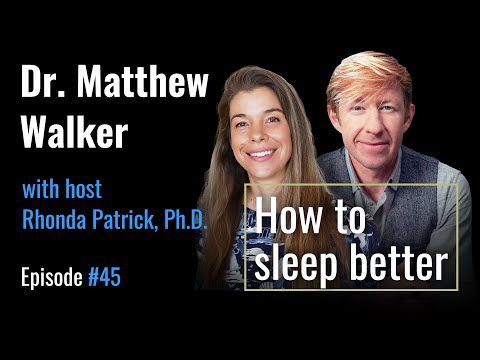
Nikolas Kong
shared a link post in group #Leverage Your Biology via #sleep

www.youtube.com
Dr. Matthew Walker on Sleep for Enhancing Learning, Creativity, Immunity, and Glymphatic System
This episode features Matthew Walker, PhD, who is a professor of neuroscience and psychology at the University of California, Berkeley, and serves as the Director of the Center for Human Sleep Science. Formerly, Dr. Walker served as a professor of psychiatry at the Harvard Medical School. Walker's research examines the impact of sleep on human health and disease. One area of interest focuses on identifying "vulnerability windows" during a person's life that make them more susceptible to amyloid-beta deposition and, subsequently, Alzheimer's disease later in life. In this episode, we discuss how sleep plays a critical role in learning and memory, in the regulation of emotions including loneliness, in the function of the immune system, preventing the formation of amyloid beta plaques in the brain and Alzheimer's disease, glucose regulation and insulin sensitivity. We also discuss how certain dietary macronutrients affect sleep, the effect of sleeping pills and alcohol on sleep, the accuracy of sleep trackers, and so much more. Chapters 00:00:00 - Introduction 00:00:18 - Sleep during development 00:04:14 - Sleep boosts learning 00:13:05 - Learning in contexts 00:18:11 - REM enables creativity 00:23:17 - Dream recollection 00:26:27 - Loneliness 00:35:28 - Impulsiveness 00:38:20 - Psychiatric conditions 00:43:00 - Meditation for insomnia 00:44:09 - Light exposure 00:51:42 - How much sleep is enough? 00:56:08 - Temperature triggers sleep onset and depth 01:02:08 - Panacea 01:09:11 - Immunity & Cancer 01:16:26 - Hormonal imbalance 01:18:40 - Alzheimer's 01:27:59 - Sleep depth 01:30:47 - Sleep apnea 01:33:26 - Preventing dementia 01:36:15 - Sleep changes with age 01:40:34 - Sleep tracking technology 01:43:07 - Blood pressure 01:45:40 - Evolutionary drive 01:48:14 - 4 Pillars of Sleep 01:51:30 - Sleep chronotypes 01:57:50 - Blood sugar regulation 02:04:23 - Appetite & satiety 02:11:10 - Microbiome 02:15:19 - Tips for better sleep 02:20:36 - Alcohol and Caffeine 02:24:05 - Maijuana, CBD, THC 02:26:40 - Sleeping pills 02:31:19 - Cognitive-behavior-therapy for insomnia ▶︎ Get the episode's show notes and transcript. https://www.foundmyfitness.com/episodes/matthew-walker ▶︎ Get Dr. Mathew Walker's New York Times bestselling book: Why We Sleep. https://www.simonandschuster.com/books/Why-We-Sleep/Matthew-Walker/9781501144325 ▶︎ Did you enjoy this podcast? It was brought to you by people like you! Become a member of the community by supporting the podcast with your own pay-what-you-can subscription. https://www.foundmyfitness.com/crowdsponsor ▶︎ Submit your raw genetic data. You can find the circadian report and APOE report at https://www.foundmyfitness.com/genetics.
